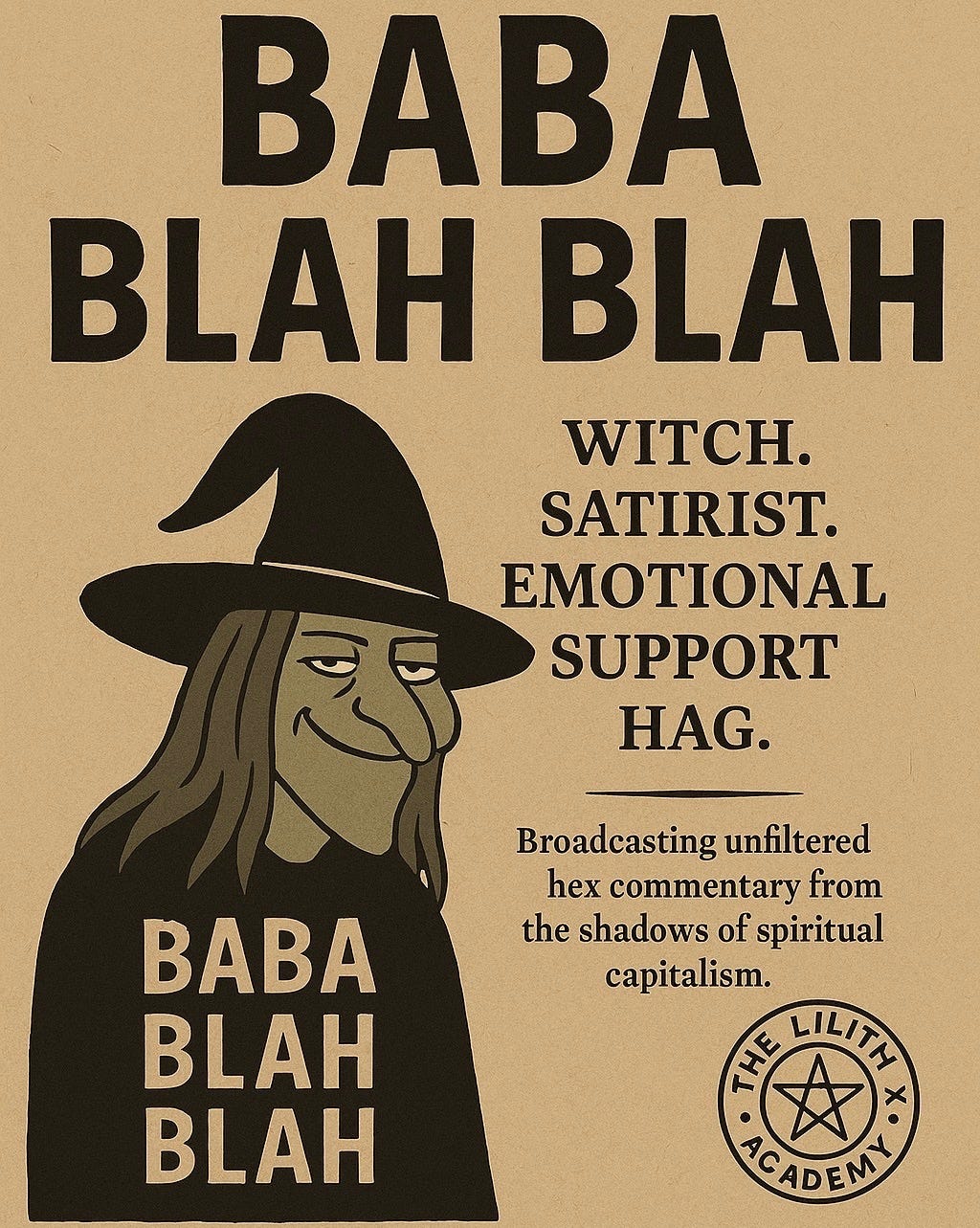In Defense of Willful Folly: Why Baba, Blah Blah Exists
Reflections on Humor, Satire and Sacredness
This week, I unleashed a little satirical, mean, and moody witch onto Instagram named Baba, Blah Blah—and let’s just say she didn’t crawl out of a crystal shop in Sedona.
She was summoned straight from the mildew-ridden basement of humanity’s collective shadow—the crusty Tupperware in Pandora’s Box that even the gods forgot about. She’s the spiritual equivalent of unclaimed baggage at the airport of your soul: weird, unattended, and no longer pretending to belong to anyone.
In short? She’s got nothing to lose but the dead weight of everyone’s glitter-dusted, high-vibe delusions.
Predictably, a handful of spiritually constipated New Age folks scolded me. Not outright—no one ever says, "You're threatening the empire of curated sacredness I'm clinging to." Instead, they say it's "low vibration."
Low vibration. The favorite dog whistle of spiritual bypassers who've never met a shadow they didn't run from.
I find it funny. And ironic. And also, in a way that hurts deep down in my ancestral bones—repulsive. Because what's more low vibration than gatekeeping joy, satire, irreverence, and wildness?
What's more colonized than policing humor like it's sin?
This, to me, is the sacred comedy of our time: that so many of the people trying to "reclaim spirit" are doing so with the exact same tired, disembodied morality that's been weaponized against the soul for centuries.
They've just traded in the rosary for a rose quartz.
In tribal societies, the fool wasn't an embarrassment. The trickster wasn't exiled. They were medicine. The Heyoka. The Coyote. Loki. The sacred clown. The paradox in flesh.
The fool whose job was to snap us out of our self-importance before it became a crown.
Because unchecked self-importance becomes empire. Becomes kings and queens and false thrones. Becomes WETIKO—the narcissistic virus of domination, masked as righteousness.
[ PHOTO: Heyoka ]
And what have we become in its absence? Free-range humans with no herder. No jester. No archetypal slap to the face reminding us that we're mortal.
We are flesh and bone and breath and gut and shit and stardust. We're not omniscient. We're visitors in a meat suit. And while we're here, our job is not to transcend life. It's to look around. On purpose.
There is a concept called “willful folly” that comes directly from the Yaqui wisdom shared in Carlos Castaneda’s books, especially A Separate Reality (1971). In it, Castaneda’s teacher, Don Juan Matus, a Yaqui Indian sorcerer, teaches him the practice of what he calls controlled folly.
Controlled folly is the art of acting with full commitment and intensity—while knowing, deep down, that none of it ultimately matters in the way we think it does. It’s not about apathy. It’s about awareness. Life is absurd, hilarious, painful, beautiful, and yes—temporary. But the warrior walks through it anyway, with precision, power, and a wild kind of grace.
Don Juan puts it like this:
“A warrior acts as if he knows what he is doing, when in fact he knows nothing. Controlled folly is not being irresponsible; it’s knowing that your actions are meaningless—and acting anyway, with all your heart.”
Willful folly is not insanity.
The truth is insanity is what happens when the container of civilization has become so tight—ideologically, spiritually, emotionally—that the soul turns on itself.
There's nowhere to go. No room to move. It suffocates.
Willful folly is the opposite. It's the conscious, chosen path of mischief and rupture. It's the sacred art of breaking the fourth wall before it collapses on your psyche.
It's the trickster.
It's Baba, Blah Blah.
And those who can't see the medicine in it? Those who scold it, shrink from it, dismiss it as "unprofessional," "too much," or "not serious enough"—they are the ones still hypnotized by the Empire's moral algorithm.
Modern psychology has pathologized what tribal cultures knew to be necessary:
The wide container. The permission to shapeshift. The divine comedy of being human.
Instead, it teaches us to cope within the narrow box of "functionality." It cannot liberate us because it cannot afford to. It plays by the same colonial rules it claims to heal us from.
And so I don't play by them. Everything I do, I do on purpose.
Even Baba, Blah Blah. Especially Baba, Blah Blah.
Because our ancestral memory remembers the importance of the fool. Of the jester. Of the one who doesn't just do serious work—but interrupts it. Who reminds the underworld priestess that she, too, can laugh.
That is the real healing: To remember that we are not just grief. Not just catharsis. Not just shadow. Not just sacred.
We are also satire. Also sass. Also trickster. Also mess.
When you willfully dance across the polarities of your own personality, of your culture, of your myth—you become too big for the container.
And then the container will do what containers always do: It will call you dangerous. Call you unserious. Call you "low vibration."
But really, it's just afraid of your freedom. And maybe—quietly—hungry for it.
Chicano Clown Culture: A Legacy of Sacred Satire
In Chicano culture, the image of the clown is more than just a symbol—it's a statement. The "Smile Now, Cry Later" masks, the intricate clown tattoos, and the stylized makeup are all expressions of a deeper narrative. These images reflect the duality of life, the balance between joy and sorrow, and the resilience found in humor amidst adversity.
This cultural expression has roots in indigenous traditions. The sacred clown, or Heyoka, in Lakota culture, is a figure who acts in contradiction to societal norms, using humor and satire to challenge and teach. Similarly, the Coyote in various Native American traditions is a trickster figure, embodying both wisdom and folly to convey important life lessons.
[ image from: Easy Chola Clown Makeup on YouTube ]
The adoption of clown imagery in Chicano culture can be seen as a continuation of these indigenous practices. It's a way to honor the past while navigating the complexities of modern identity. The clown becomes a vessel for storytelling, resistance, and healing—a reminder that laughter can be a powerful tool for survival and transformation.
Personal Reflections: Embracing the Trickster Within
In the early 2000s, I was invited to the Hopi reservation to witness the sacred rain dances. It was a profound experience, one that left an indelible mark on my spirit. During my visit, an elder told me that I carried Coyote medicine. I had always sensed this within me, a natural inclination towards humor and disruption, traits I inherited from my grandfather.
[ PHOTO: The Coyote ] This is hanging on the door of my office.
He was the godfather of our family, a man who could say the most inappropriate things and still be loved for it. His humor was his power, a shield and a sword. As a woman, I've found that wielding humor comes with different challenges. Society often views funny women as threats, attributing our wit to competition rather than connection. But humor has always been my sanctuary, my way of making sense of the world and my place in it.
The Psychology of Humor: Healing Through Laughter
Even modern psychology, for all of its shortcomings and colonized frameworks, recognizes the profound impact of humor on mental health. Engaging in humor can enhance mood, reduce stress, and improve overall well-being. It's a coping mechanism that allows individuals to process difficult emotions and experiences in a manageable way .
Humor fosters social bonds, encourages creative thinking, and provides a sense of control in unpredictable situations. It's a testament to the human spirit's resilience, a reminder that even in the face of adversity, we can find reasons to smile and laugh.
“Humor, like hope, can help people cope with stress and adversity. It offers psychological distance and perspective.”
— Martin Seligman, Ph.D., Authentic Happiness
The Sacredness of Satire
Baba, Blah Blah is more than a character—she's a manifestation of ancestral wisdom, a bridge between the sacred and the profane. Through her, I channel the spirit of the Heyoka, the Coyote, and the countless tricksters who have come before. She challenges the status quo, pokes holes in pretension, and invites us all to laugh at the absurdity of our own self-importance.
In embracing willful folly, we reclaim a part of ourselves that has been suppressed by rigid norms and expectations. We remember that laughter is not a distraction from the sacred, but a pathway to it.
And in doing so, we honor the legacy of those who taught us that sometimes, the most profound truths are found in the punchline.
About the Author
Chriselda Pacheco is a chicana, political heretic and the founder of The Lilith Academy, a shadow work ecosystem for women, specializing in decolonization, Christian deconstruction, and the reclamation of feminine primordial power. A retired sex worker, independent journalist, writer, philosopher and politically homeless thinker, she examines the intersection of sex, power, myth, culture and politics with a razor-sharp wit. As a consecrated Neo-Luciferian Gnostic priestess (2014), she weaves esotericism, cultural critique, and unapologetic storytelling to expose the hidden machinery of empire and the collective shadows we refuse to face.
Find her courses, services and unfiltered takes at www.thelilithacademy.com.
You can find Baba Blah Blah on Instagram at: baba_blahblah_official
Enjoy! xo













🙌💗🧙🏽♀️ EXACTLY ‼️